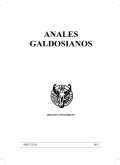
Anales Galdosianos
Scope & Guideline
Fostering Critical Engagement with Galdós's Works
Introduction
Aims and Scopes
- Galdós and Historical Contexts:
The journal emphasizes the importance of historical contexts in understanding Galdós's works, analyzing how his narratives reflect and critique the socio-political landscapes of 19th and early 20th-century Spain. - Gender Studies and Feminist Critique:
There is a consistent focus on gender dynamics within Galdós's literature, as well as the representation of women in Spanish literature, highlighting feminist perspectives and the roles of female authors. - Interdisciplinary Approaches:
The journal encourages interdisciplinary methodologies, incorporating perspectives from history, sociology, and cultural studies to enrich the understanding of literary texts. - Literary Adaptation and Reception:
An exploration of how Galdós's works have been adapted, remediated, and interpreted in various cultural contexts, reflecting on the ongoing relevance of his narratives. - Focus on Spanish Realism and Naturalism:
The journal investigates the characteristics of Spanish realism and naturalism as seen through the lens of Galdós's oeuvre, addressing themes of social class, race, and identity.
Trending and Emerging
- Postcolonial and Global Perspectives:
Recent publications have increasingly examined Galdós's works through postcolonial lenses, exploring themes of imperialism, race, and identity, thereby situating his literature within global contexts. - Gothic and Supernatural Elements:
There is a growing interest in the gothic and supernatural aspects of Spanish literature, particularly in relation to Galdós, as scholars investigate how these elements interact with cultural anxieties and historical narratives. - Intersections of Literature and Medicine:
An emerging theme is the exploration of the intersections between literature and medical discourse, particularly in relation to societal issues such as epidemics and mental health, reflecting contemporary concerns. - Digital Humanities and Adaptation Studies:
The journal is increasingly engaging with digital humanities methodologies and adaptation studies, which analyze the remediations of Galdós's works, suggesting a modern approach to literary scholarship.
Declining or Waning
- Traditional Literary Criticism:
There appears to be a decrease in the publication of papers that strictly adhere to traditional literary criticism without integrating contemporary theoretical frameworks. This shift may indicate a move towards more dynamic and multifaceted approaches to analysis. - Focus on Galdós's Early Works:
There has been a noticeable decline in scholarly attention to Galdós's earlier novels, suggesting that researchers may be more inclined to explore his later works or the broader implications of his literary legacy. - Narrow Historical Studies:
Papers focused solely on narrow historical analyses of specific events without connecting them to broader literary or cultural themes have become less prevalent, indicating a trend towards more holistic approaches.
Similar Journals

Eixo e a Roda-Revista de Literatura Brasileira
Unlocking New Perspectives in Brazilian LiteratureEixo e a Roda-Revista de Literatura Brasileira is a pioneering academic journal dedicated to the exploration and dissemination of Brazilian literature, published by the Federal University of Minas Gerais, Faculty of Letters. Since its inception in 1982, this Open Access journal has provided a vital platform for researchers, educators, and enthusiasts to share innovative ideas and critical analyses related to Brazilian literary studies. With its ISSN 0102-4809 and E-ISSN 2358-9787, the journal attracts a diverse readership and invites submissions that contribute to the richness of Brazilian cultural discourse. Located in Belo Horizonte, Brazil, the journal plays a critical role in advancing scholarly dialogue and promoting accessibility in literature research, fostering an inclusive environment for academic exchange.
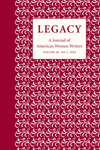
LEGACY
Illuminating Diverse Perspectives in Literature and GenderLEGACY is a prominent journal published by University of Nebraska Press, dedicated to exploring the multifaceted relationships between literature, culture, and gender studies. With an ISSN of 0748-4321, this journal has established itself as a platform for critical discourse since its inception in 2002. As a Q4 ranked publication in both Gender Studies and Literature and Literary Theory, LEGACY engages with diverse perspectives and timely topics, providing a unique opportunity for scholars to contribute to ongoing debates in these fields. Although it does not operate under an open access model, its content remains essential for researchers, professionals, and students seeking to expand their knowledge and understanding of complex literary and gender issues. With a commitment to enriching the academic landscape, LEGACY aims to foster dialogue and inspire future scholarship through its thoughtful articles and critical analyses.
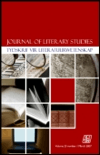
Journal of Literary Studies
Championing accessibility in literary scholarship.Journal of Literary Studies, published by UNISA PRESS, is a premier open access journal dedicated to advancing the field of literature and literary theory. With its ISSN 0256-4718 and E-ISSN 1753-5387, the journal has established itself as a leading platform for innovative research since its inception in 1985, with a notable convergence period running through to 2024. Recognized in the Q1 quartile of literature and literary theory, the journal ranks impressively at #236 out of 1106 in its category according to Scopus, highlighting its impact in the arts and humanities with a percentile rank of 78th. The journal's open access model, adopted in 2022, reflects its commitment to accessibility and dissemination of knowledge globally, making it an essential resource for researchers, academics, and students alike. With an editorial focus on interdisciplinary approaches and contemporary critical discourse, the Journal of Literary Studies serves as a vital vessel for the exchange of ideas and scholarly dialogue in the intricate landscape of literary studies.

CELEHIS-Revista del Centro de Letras Hispanoamericanas
Bridging Cultures Through Scholarly DiscourseCELEHIS-Revista del Centro de Letras Hispanoamericanas is an esteemed academic journal dedicated to the exploration and dissemination of research in the field of Hispanic literature and cultural studies. Published by the UNIV NAC DE MAR DEL PLATA-CENTRO LETRAS HISPANOAMERICANAS, this journal has embraced open access since 2014, making its rich repository of scholarly articles available to a global audience. The journal aims to foster knowledge and dialogue surrounding the diverse literary expressions of Hispano-American cultures, providing insights that are crucial for researchers, professionals, and students alike. With its commitment to scholarly excellence, CELEHIS plays a significant role in enhancing the understanding and appreciation of Latino literature, while encouraging interdisciplinary collaboration and critical discourse within the academic community. Located in Mar del Plata, Buenos Aires, Argentina, it stands as a crucial platform for voices in the field, facilitating a deeper engagement with the literary heritage of the Spanish-speaking world.

Revue Italienne d'Etudes Francaises
Illuminating the Dynamics of Francophone CultureRevue Italienne d'Etudes Francaises, published by SEMINARIO FILOLOGIA FRANCESE, is a pivotal open access journal dedicated to the exploration and analysis of French studies within the broader context of history, linguistics, and literary theory. Since its inception in 2011, this journal has fostered scholarly dialogue and critical discourse, offering a platform for researchers, professionals, and students alike to disseminate their work and engage with contemporary issues in these fields. With an ISSN and E-ISSN of 2240-7456, the journal has established itself within the academic community, although it currently ranks in the lower quartiles across various disciplines, as indicated by its Scopus metrics. Nevertheless, the Revue Italienne d'Etudes Francaises remains an essential resource for those seeking to deepen their understanding of Francophone literature, culture, and linguistic dynamics from its base in Rome, Italy, at C/O Fondazione Primoli. As the field of French studies continues to evolve, this journal plays an important role in highlighting the latest research findings and theoretical advancements.
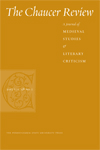
CHAUCER REVIEW
Navigating the Rich Tapestry of Chaucerian ThoughtCHAUCER REVIEW, an esteemed journal published by Penn State University Press, serves as a leading platform for scholarly discourse in the field of Literature and Literary Theory. Since its inception in 1979 and with coverage extending from 2002 through to 2024, this journal has earned its position in the top tier, achieving a Q1 ranking in the 2023 category of Literature and Literary Theory, placing it within the 87th percentile among peers in the Scopus ranking system. This robust academic publication is dedicated to exploring the intricacies of Geoffrey Chaucer's works while also contributing to the broader understanding of literary studies. Although it is not an open-access journal, it provides valuable insights, critical analyses, and interdisciplinary perspectives that are indispensable for researchers, professionals, and students alike in the continual evolution of literary scholarship. With its rich heritage and commitment to excellence, CHAUCER REVIEW remains a vital resource for those seeking to deepen their understanding of Chaucer’s enduring influence and the literary canon.

Novoe Literaturnoe Obozrenie
Illuminating Contemporary Literary LandscapesNovoe Literaturnoe Obozrenie, an esteemed publication dedicated to the realms of Cultural Studies and Literature and Literary Theory, serves as a vital resource for scholars and professionals alike. Published by NOVOE LITERATURNOE OBOZRENIE-NEW LITERARY OBSERVER in the Russian Federation, this journal provides critical insights and scholarly critiques that reflect the evolving landscape of literary discourse. With an established H-index and a focus on fostering academic inquiry, the journal has secured its place amidst contemporary scholarly discussions, indexed in Scopus with rankings that illustrate its commitment to quality despite a current presence in the lower quartiles. Novoe Literaturnoe Obozrenie is a non-open-access journal, encouraging a traditional yet scholarly approach to literary studies and remains an essential read for researchers, students, and professionals that seek to deepen their understanding of literature’s impact on culture and society. Publishing from 2016 until 2024, it continues to bridge theoretical frameworks with practical discourse, making significant contributions to the fields it encompasses.

Studia Aurea-Revista de Literatura Espanola y Teoria Literaria del Renacimiento y Siglo de Oro
Exploring the Rich Tapestry of Spanish LiteratureStudia Aurea-Revista de Literatura Espanola y Teoria Literaria del Renacimiento y Siglo de Oro, published by the esteemed Universitat Autònoma de Barcelona, stands as a pivotal academic resource in the fields of Literature and History, specializing in Spanish literature from the Renaissance and the Golden Age. With its Open Access model established since 2007, this journal ensures that groundbreaking research is readily available to scholars and enthusiasts worldwide. Notably recognized for its quality, in 2023 it achieved Q1 rankings in both History and Literature and Literary Theory, reflecting its significant contribution to advancing knowledge in these domains. The journal's Scopus rankings further underscore its impact, placing it in the top 20% for literature and the top 37% for history. As it converges from 2018 to 2023, Studia Aurea continues to facilitate critical discussions, innovative research, and the exploration of literary theories, making it an essential platform for researchers, professionals, and students alike.
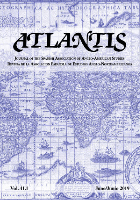
Atlantis-Journal of the Spanish Association of Anglo-American Studies
Navigating the complexities of Anglo-American studies with insight.Atlantis - Journal of the Spanish Association of Anglo-American Studies is a prestigious peer-reviewed journal dedicated to advancing scholarship in the fields of literature, cultural studies, and linguistics. Published by the Asociación Española de Estudios Anglo-Norteamericanos (AEDEAN) since 1979, this open-access journal provides a dynamic platform for researchers to share innovative ideas and engage in cutting-edge discourse. With a notable impact reflected in its 2023 quartiles—ranking Q1 in Literature and Literary Theory, and Q2 in both Cultural Studies and Linguistics and Language—Atlantis positions itself as a leading resource for scholars navigating complex interdisciplinary challenges. The journal has garnered respect in the academic community, achieving impressive Scopus rankings, including a 90th percentile ranking in Literature and Literary Theory. Located in Madrid, Spain, Atlantis not only contributes to the vibrant dialogue within its fields but also offers essential insights into the intricacies of Anglo-American studies.

Literature Compass
Unraveling the Complexities of Text and ContextLiterature Compass, published by WILEY, is an esteemed journal in the field of Literature and Cultural Studies, reflecting a robust commitment to advancing scholarly discourse since its inception in 2004. With an impressive Q1 ranking in Literature and Literary Theory and a Q2 ranking in Cultural Studies as of 2023, the journal stands out as a critical resource for researchers, professionals, and students alike, offering insights into contemporary literary analysis and cultural critique. While not operating as an open access journal, it provides a wealth of peer-reviewed articles that delve into the complexities of literature and its societal implications. The journal’s unique aim is to bridge diverse literary topics, facilitating a holistic understanding of narrative forms and their cultural contexts. As part of a prestigious academic tradition, Literature Compass is published from the United Kingdom and serves as a vital platform for intellectual exchange in an increasingly interconnected world.